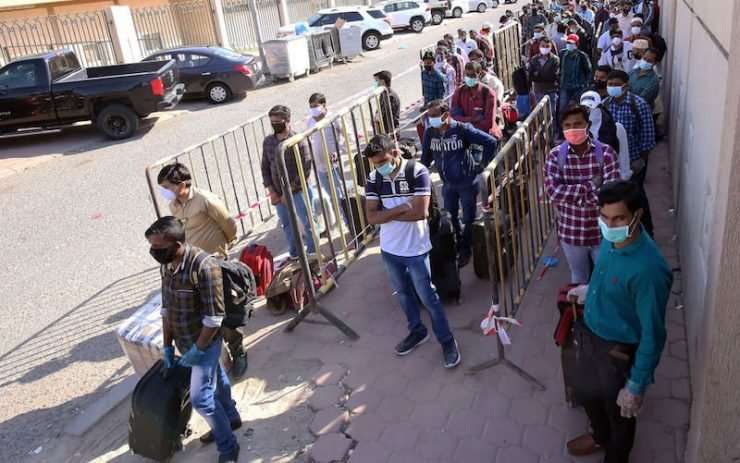Latest News
- Court Sentences Bank Employee To 5 Years For Embezzling 100,000...
- Fake ‘Sheikh’ Sentenced To 2-yr As Court Overturns Verdict
- Justice Ministry New Service On The Sahel App
- Ministry Probes 68 Cases Of Illegal Charity, Funds Collection
- Globally, Kuwait Is Among The Top Consumers Of Incense And Oud O...
- Decrease Seen In Foreign Investment
- Kuwait Customs Seized 2 Containers Laden With Tobacco At Shuwaik...
- Unpaid Salaries, Accountant Beaten Up By Workers
- The Sahel App Was Not Hacked, A Spokesman Claims
- Four Expats Arrested For Stealing Copper Cables Worth 60,000 Din...
- Indian National Died In Abdalli Car Accident
- Work Permits And Foreign Worker Transfers Are Amended By PAM
Gulf Expat Exodus Could Continue Until 2023, S&p Says

The population in the Gulf Cooperation Council (GCC) states declined by about 4% last year due to an exodus of expatriates after the coronavirus crisis and lower oil prices, S&P Global Ratings said in a report on Monday.
The oil producing region was hit hard last year as COVID-19 restrictions impacted non-oil economic sectors, and lower oil prices and crude output cuts weighed on its main income source.
“We expect the proportion of foreigners in the region will continue to decline through 2023 relative to the national population, because of subdued non-oil sector growth and workforce nationalization policies,” S&P said.
Gulf states rely heavily on foreign workers in sectors ranging from financial services to healthcare and construction, but efforts to nationalise the workforce to fight rising unemployment among nationals have accelerated in recent years.
The overall GCC population is unlikely to return to 2019 levels of 57.6 million people until 2023, S&P said.
“These changes could have repercussions for the regional economy and pose additional challenges to diversifying away from its heavy reliance on the hydrocarbon sector in the long run, if not met with economic and social reforms that foster human capital,” it said.
S&P estimated the sharpest population decline last year occurred in Dubai, the Middle East business hub, where the impact of the pandemic on key employment sectors like aviation, tourism and retail led to an 8.4% population decline.
In Oman, where the government has in recent weeks intensified a long-standing policy, known as Omanisation, to create employment for its citizens, the expat population declined by about 12% last year, the agency said.
SOURCE INDIANSINKUWAIT
Trending News
-
 Eid Al Fitr 2024: Crescent Moon Not Sighted In Sau...
08 April 2024
Eid Al Fitr 2024: Crescent Moon Not Sighted In Sau...
08 April 2024 -
 Kuwait Implements Home Biometrics Services Ahead O...
14 April 2024
Kuwait Implements Home Biometrics Services Ahead O...
14 April 2024 -
 When Will Eid Al Fitr 2024 Take Place In Qatar, Ba...
08 April 2024
When Will Eid Al Fitr 2024 Take Place In Qatar, Ba...
08 April 2024 -
 On Sunday, The Meteorological Department Warns Of...
07 April 2024
On Sunday, The Meteorological Department Warns Of...
07 April 2024 -
 Kuwait Airways Provides Update On Flight Schedule...
14 April 2024
Kuwait Airways Provides Update On Flight Schedule...
14 April 2024 -
 Gathering For Eid Al-Fitr Prayers: Kuwaiti Citizen...
10 April 2024
Gathering For Eid Al-Fitr Prayers: Kuwaiti Citizen...
10 April 2024 -
 Winners Of Kuwait National Assembly 2024 Elections
06 April 2024
Winners Of Kuwait National Assembly 2024 Elections
06 April 2024 -
 Kuwait Airways Introduces Convenient Home Luggage...
15 April 2024
Kuwait Airways Introduces Convenient Home Luggage...
15 April 2024 -
 An Egyptian Expat Dies At Kuwait's Airport
11 April 2024
An Egyptian Expat Dies At Kuwait's Airport
11 April 2024 -
 Bay Zero Water Park Kuwait: Summer Season Opens Ei...
11 April 2024
Bay Zero Water Park Kuwait: Summer Season Opens Ei...
11 April 2024












Comments Post Comment